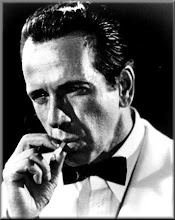 Welcome to the 6 o'clock news, I'm your anchor, Thor Buttocks. In a previous post (1), I neglected to mention Effexor's incest surviving son Pristiq. I came across this study (2), which was published earlier this year. The results from this pharmaceutical industry sponsored trial are not surprising, "Desvenlafaxine is an effective nonhormonal treatment for vasomotor symptoms in postmenopausal women." Case closed...unless you actually read beyond the abstract.
Welcome to the 6 o'clock news, I'm your anchor, Thor Buttocks. In a previous post (1), I neglected to mention Effexor's incest surviving son Pristiq. I came across this study (2), which was published earlier this year. The results from this pharmaceutical industry sponsored trial are not surprising, "Desvenlafaxine is an effective nonhormonal treatment for vasomotor symptoms in postmenopausal women." Case closed...unless you actually read beyond the abstract.This was a 52-week long study (a rarity in psychiatry), which on the surface, sounds as if it could have generated a lot of good data. 707 healthy, postmenopausal women experiencing 10.9 hot flashes and 3.7 nighttime awakenings per day were randomized into one of five treatment arms: desvenlafaxine 50mg, 100mg, 150mg, 200mg, or placebo. The primary efficacy measures were completed at 4 weeks, at 12 weeks, and at...that's it. Out of 52 weeks, only efficacy data were gathered for 12 weeks. That's 40 weeks of data that are not reported. I wonder why? It certainly couldn't be that desvenlafaxine doesn't work that well. Surely not, no way, never.
First, let me say that these data can be trusted. Why did I say that? Because, according to this article, the "statistical analysis was carried out by the Biostatistics Section of Wyeth Research." Nothing like those good old in house (i.e., paid employee) statisticians to handle test data (it's a good thing you can't lie with statistics, 3). The "100mg/d produced a significantly greater decrease from baseline in the average daily number of moderate-to-severe hot flushes compared with placebo at both weeks 4...and 12...the desvenlafaxine 150mg group differed significantly...at week 12....but not week 4...there was no significant difference from placebo for the desvenlafaxine 50 and 200mg doses at either time point." Additionally, there was a significant reduction in nighttime awakenings for the 100, 150, 200mg doses of desvenlafaxine compared to placebo.
Don't let the short phrase "statistically significant difference" fool you, because the differences are rather clinically insignificant. The 100mg dose produced the highest decrease in the number of daily hot flashes, averaging -7.23. The placebo arm was -5.50. That's a paltry difference of -1.73. The difference for the number of nighttime awakening is even smaller. -2.77 episodes for 100mg compared to -2.21 for placebo. That's a difference of -.56, one half of one full awakening episode (anything is possible with statistics). And of course, the desvenlafaxine groups had significantly more discontinuations and treatment emergent adverse events than placebo, thus justifying the use of desvenlafaxine to treat these symptoms.
What about those missing 40 weeks? How did placebo compare at the end of 52 weeks? I guess we will never know. Perhaps I am drawing a false conclusion here (admittedly, I'm biased), but if the results were significant beyond 12 weeks, I think the "scientists" would have reported those data. The remaining 40 weeks were ostensibly use to determine the "safety and tolerability" of desvenlafaxine (a noble goal that should have been accomplished in phase II trials).
A special thanks is also noted in this article "The authors thank Drs. Kathleen Dorries and Mary Hanson for assistance in the writing and review of this manuscript." I couldn't find any information on Mary Hanson, but Kathleen Dorries works for Advogent Group (4), which "create, deliver, and manage compliant communications and strategic solutions and services for the leading pharmaceutical, biotechnology and medical device companies." Apparently Kathleen Dorries has help write another paper on desvenlafaxine as well (5).
In summation, not only did the sponsor handle the management of the data, the manuscript was at least partially ghost written by people whose purpose is to "promote" rather than report. This study should be filed under infomercial, not science.





No comments:
Post a Comment